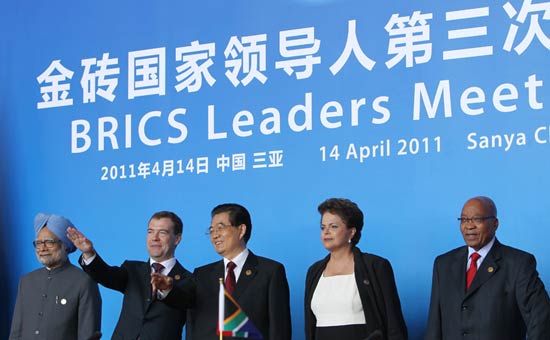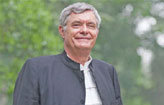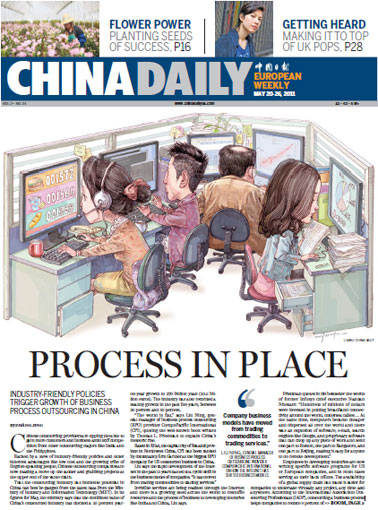Economy
No agreement yet on new IMF chief
Updated: 2011-05-23 10:11
By Shamim Adam (China Daily)
|
 From left to right: Manmohan Singh, India's prime minister, Dmitry Medvedev, Russia's president, Hu Jintao, China's president, Dilma Rousseff, Brazil's president, and Jacob Zuma, South Africa's president, pose for a group photo in Sanya, Hainan province. Leaders from Brazil, Russia, India, China, and South Africa met on April 14 for the 2011 BRICS Summit. [Photo/ Agencies] |
Several candidates suggested as Strauss-Kahn's replacement
SINGAPORE - The failure of emerging-market nations to rally behind a single candidate to head the International Monetary Fund (IMF) shows the effort still needed to link diplomatic might with growing economic strength.
As the IMF begins its search for a successor to Dominique Strauss-Kahn, Russia is endorsing Grigori Marchenko, the head of Kazakhstan's central bank, while the Philippines and Thailand speak favorably of Singapore Finance Minister Tharman Shanmugaratnam. India, China, Brazil and South Africa have yet to throw their support behind anyone even as they urge selection be driven by merit rather than nationality.
|
||||
"The Europeans have the great advantage that they have institutional mechanisms to agree on a candidate upfront," said Ousmene Mandeng, head of public sector investment at Ashmore Group Plc in London and a former IMF economist. "The emerging markets may find it more difficult to identify a common candidate and then lobby to ensure that he or she obtains sufficient support from the United States."
As recently as last month the leaders of Brazil, Russia, India and China, known as the BRIC countries, were urging the US and Europe to end their 65-year monopoly on leadership positions at the IMF and World Bank, which has always been headed by an American. South Africa is now part of the group, which consequently changed its name to BRICS.
June 30 goal
The IMF said it aims to complete the selection of a successor to Strauss-Kahn by June 30. Countries will be able to nominate candidates for the managing director's position between May 23 and June 10, the IMF said in a statement.
"The governing structure of the international financial institutions should reflect the changes in the world economy, increasing the voice and representation of emerging economies and developing countries," the BRICS leaders said in a statement after meeting in Hainan, China, on April 14.
Those positions were echoed by finance chiefs last week following the arrest and subsequent resignation of Strauss-Kahn. The new leadership should reflect changes in the world economy, People's Bank of China Governor Zhou Xiaochuan said on May 19.
E-paper

Thawing out
After a deep freeze in sales during the recession, China’s air conditioner makers are bouncing back
Cool Iron lady
Of good and evil
Build on security initiatives
Specials

Memory lanes
Shanghai’s historic ALLEYS not just unique architecture but a way of life

Great expectations
Hong Kong-born singer songwriter rises to the top of the UK pops.

A diplomat of character
Belgian envoy draws on personal fascination to help build China ties.




